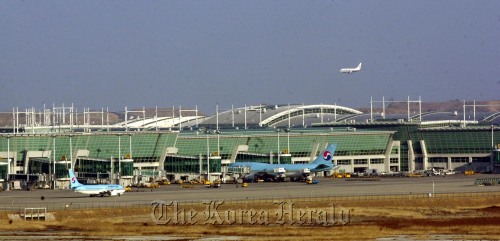Ruling camp pushes to sell 15 percent stake to low-income earners
The government’s plan to sell a stake in Incheon International Airport Corp. has reignited a years-old controversy as to why the well-performing airport should be handed over to private hands.
The presidential office of Cheong Wa Dae, the ruling Grand National Party and the Finance Ministry have decided to sell a 15 percent stake in the airport through an initial public offering this year or early next year. The shares will be offered to Korean nationals only at a steep discount, they said.
“The government is positively considering selling a 15 percent stake through an offering of national shares,” an official at the Finance Ministry said. The proceeds from the stake sale will be used to fund expansion of the airport, he said.
The government’s plan to sell a stake in Incheon International Airport Corp. has reignited a years-old controversy as to why the well-performing airport should be handed over to private hands.
The presidential office of Cheong Wa Dae, the ruling Grand National Party and the Finance Ministry have decided to sell a 15 percent stake in the airport through an initial public offering this year or early next year. The shares will be offered to Korean nationals only at a steep discount, they said.
“The government is positively considering selling a 15 percent stake through an offering of national shares,” an official at the Finance Ministry said. The proceeds from the stake sale will be used to fund expansion of the airport, he said.

By offering of national shares, the official meant a process similar to the IPOs of steelmaker POSCO and Korea Electric Power Corp. in the late 1980s, in which some portions of the shares offered were exclusively for ordinary Koreans and were sold over the counter.
The idea was first floated by Rep. Hong Joon-pyo, chairman of the GNP. He proposed in a radio speech earlier in the week that 49 percent of airport shares should be offered to people in low-income brackets at a 20 to 30 percent discount.
Opposition parties and civic groups rapped the stake sale plan, calling it a populist move ahead of elections next year.
Arguing that Incheon airport should never be privatized, they suspect hidden motives behind the government’s persistent attempt at selling the airport shares.
The government, in 2008, had announced a plan to sell a 49-percent stake in the firm, as part of the government’s drive to overhaul the public sector through partial or full privatizations of state-run companies.
Under the plan, a 15 percent stake was supposed to be handed over to a foreign airport operator, as part of a strategic tie-up which the government said would help grow Incheon into an international air hub.
The plan for partial privatization has since stalled in the face of negative public sentiment.
Critics said that a private airport operator, exploiting its monopolistic market position, would raise airport fees to maximize profits.
Some went a step further to suspect that President Lee Myung-bak was intent on selling the airport to a specific foreign investor ― Macquarie of Australia.
The unlisted Incheon International Airport has total assets of 7.8 trillion won. Last year, it reported revenues of 1.28 trillion won and a net profit of 324 billion won.
“The Lee Myung-bak administration, which was then so keen on selling the airport to foreigners, has suddenly come up with a plan to offer the shares to the public as national shares,” said Rep. Lee Yong-sup, a spokesperson for the main opposition Democratic Party.
He said he can not but question the true motive behind the proposal, other than the stated aim of raising a fund for the airport’s expansion. He also refuted the government’s argument that privatization would help the airport to sharpen competitiveness and to improve management efficiency.
“Incheon airport is already ahead of its competitors,” Lee said, citing the review by Airport Council International, a global association of 1,700 airports.
The ACI named Incheon as the world’s best airport in 2011 for a sixth year in a row.
Citizens’ Coalition for Economic Justice, a Seoul-based civic group, criticized that the government was formulating a sale plan, without properly answering a fundamental question ― why in the first place should the airport be privatized.
“There seems to be no convincing reason other than that the ruling camp wants to resolve a fiscal problem, caused by the costly four-river restoration project, with the proceeds from the stake sale,” it said in a press statement.
In a survey conducted in last September, 56 percent of Koreans said they opposed the airport privatization. Only 15 percent said they agreed.
By Lee Sun-young (milaya@heraldcorp.com)








![[Kim Seong-kon] Democracy and the future of South Korea](http://res.heraldm.com/phpwas/restmb_idxmake.php?idx=644&simg=/content/image/2024/04/16/20240416050802_0.jpg&u=)







![[KH Explains] Hyundai's full hybrid edge to pay off amid slow transition to pure EVs](http://res.heraldm.com/phpwas/restmb_idxmake.php?idx=652&simg=/content/image/2024/04/18/20240418050645_0.jpg&u=20240418181020)

![[Today’s K-pop] Zico drops snippet of collaboration with Jennie](http://res.heraldm.com/phpwas/restmb_idxmake.php?idx=642&simg=/content/image/2024/04/18/20240418050702_0.jpg&u=)